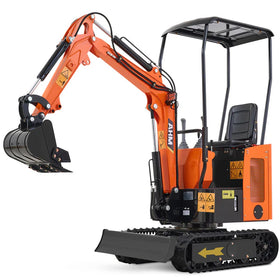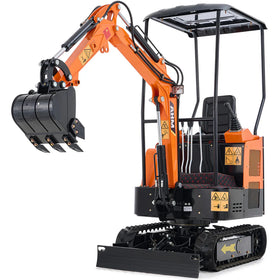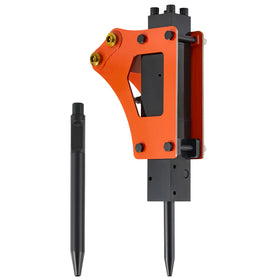As people look for affordable options, Chinese mini excavators have emerged as popular alternatives to established Western and Japanese brands. But are they worth considering? In this guide I will analyze the real advantages and drawbacks of Chinese-made mini excavators based on the most up to date industry data to help you make an informed decision.
What Makes a Mini Excavator "Chinese"?

Chinese mini excavators are compact digging machines manufactured in China, either by Chinese companies or through joint ventures with international brands. These machines typically weigh between 1.5 and 10 tons and feature the same basic components as their American, European, and Japanese counterparts: tracks, boom, arm, bucket, and cab.
The Chinese construction equipment industry has grown dramatically in the past decade. According to the China Construction Machinery Association, Chinese manufacturers now produce over 200,000 excavators annually, with exports increasing by approximately 35% year-over-year since 2018.
Why Chinese Mini Excavators Cost Less
The price difference between Chinese excavators and established Western brands can be substantial—often 30-50% less for comparable specifications. This cost advantage stems from several factors:
Lower Manufacturing Costs
"Manufacturing costs in China remain lower than in countries like the United States, Germany, and Japan," notes the U.S. Department of Commerce in their 2023 construction equipment market report. "Labor costs can be 60-75% lower, creating big savings across production."
Chinese manufacturers also benefit from:
- Lower regulatory compliance costs
- More streamlined supply chains
- Less expensive raw materials sourcing
- Government subsidies and tax advantages
- Economies of scale from high-volume production
The combination of these factors allows Chinese manufacturers to offer mini excavators at prices that Western and Japanese brands simply cannot match.
Further Reading: What You Should Know About Chinses Mini Excavator Parts Knowledge
Pros of Chinese Mini Excavators

1. Significant Cost Savings
The most obvious advantage is the price—you can often purchase a new Chinese mini excavator for roughly the same cost as a used machine from a premium brand. For small contractors or property owners with limited budgets, this makes owning equipment possible when it might otherwise be out of reach.
2. Improving Quality and Features
Chinese manufacturers have made substantial improvements in recent years. Many now offer:
- Tier 4 compliant engines
- Pilot-operated hydraulic controls
- Modern cab designs with A/C and heating
- LCD displays and monitoring systems
- Zero-tail swing options
"The quality gap between Chinese equipment and premium brands has gotten much smaller," says Equipment World magazine. "Today's Chinese excavators use many of the same parts and technologies found in their more expensive competitors."
3. Parts Compatibility and Availability
Many Chinese mini excavators use components similar to or compatible with more established brands. Some models even use internationally recognized parts like Kubota or Yanmar engines, making replacements easier to source.
Chinese manufacturers have also expanded their parts distribution networks in North America, with more dealers stocking common wear items.
4. Suitable Performance for Many Applications
For many standard applications, Chinese mini excavators deliver acceptable performance:
- Digging depths typically range from 7 to 12 feet
- Breakout forces from 4,000 to 9,000 lbs
- Operating weights from 1.5 to 10 tons
- Travel speeds of 2-3 mph
These specifications meet the requirements for most residential landscaping, utility work, and light construction tasks.
Cons of Chinese Mini Excavators

1. Quality Control Inconsistencies
Perhaps the biggest concern with Chinese mini excavators is inconsistent quality control. While some machines perform reliably for years, others may develop issues within the first few hundred hours of operation.
Common quality-related issues include:
- Hydraulic leaks from poorly fitted connections
- Premature bearing failures
- Electrical system glitches
- Weld failures on high-stress components
- Finish durability problems (paint and coatings)
2. Limited Dealer Support
Unlike established brands with extensive dealer networks, many Chinese manufacturers have limited service support in North America.
This can make getting repairs, warranty service, or technical assistance challenging.
Some buyers report waiting weeks or months for specialized parts that aren't stocked locally. Without a strong dealer network, you may find yourself handling more maintenance and troubleshooting on your own.
3. Documentation and Technical Information
Instruction manuals and technical documentation for Chinese excavators often suffer from poor translation, incomplete information, or outdated content. This can make operation, maintenance, and repairs more difficult, especially for those without extensive mechanical experience.
4. Resale Value Concerns
Chinese mini excavators typically depreciate faster than premium brands. While you'll pay less upfront, you'll likely recover a smaller percentage of your investment when selling.
According to EquipmentWatch data, Chinese mini excavators typically retain about 40-50% of their value after five years, compared to 55-65% for Japanese and American brands.
About Buying Through Alibaba
Many buyers consider purchasing directly from Chinese manufacturers through platforms like Alibaba. While this can offer even lower prices, it comes with significant risks:
- No local warranty support
- Complex shipping and customs procedures
- Potential for receiving a different specification than ordered
- Difficulty resolving quality issues or disputes
- No pre-delivery inspection or setup
- Complete responsibility for parts sourcing
For most buyers, especially those without import experience, working with an established U.S.-based dealer of Chinese equipment provides a better balance of savings and support.
US Dealers That Sell Chinese Equipment
Several U.S.-based companies now import, prepare, and support Chinese mini excavators. These dealers bridge the gap between direct imports and premium brands by:
- Handling all import logistics
- Performing pre-delivery inspections and setup
- Providing domestic warranty support
- Stocking common parts
- Offering technical assistance
For example, AHM Equipment based in California offers Chinese-manufactured mini excavators with nationwide delivery, U.S.-based support, and parts availability—addressing many of the concerns associated with direct imports while maintaining much of the cost advantage.
Is a Chinese Mini Excavator Right for You?
Consider these factors when deciding if a Chinese mini excavator fits your needs:
Who Should Buy Chinese Mini Excavators
Chinese mini excavators work best for people who want to save money and know how to fix machines. They're good for users who only need them sometimes, using them less than 500 hours per year. Contractors who already own big-name equipment might buy Chinese machines as backups. These excavators are also a good choice when having your machine break down won't ruin your whole project. Many people buy these machines planning to keep them for 2-5 years.
Who Should Look at Other Options
Chinese excavators aren't the best choice for companies that use their machines all day, every day (more than 1,000 hours yearly). They also aren't ideal for job sites far from cities where getting help would be hard. Don't buy these if your project absolutely can't have any delays, or if you want to sell the machine later for a good price. People who don't know how to fix machines should probably choose other brands with better support.
Common Questions About Chinese Mini Excavators
1. Why are Chinese excavators so cheap?
Chinese excavators cost less primarily due to lower labor costs, less expensive raw materials, streamlined manufacturing processes, and government subsidies. Manufacturing wages in China can be 60-75% lower than in the U.S., Japan, or Europe, creating significant cost advantages throughout the production process.
2. What brand of Chinese mini excavator is most reliable?
While quality varies, several Chinese brands have established better reputations for reliability, including XCMG, Sany, and LiuGong. These larger manufacturers typically have more robust quality control processes and better international support networks than smaller brands.
3. How deep can a Chinese mini excavator dig?
Chinese mini excavators offer digging depths comparable to Western and Japanese machines of similar size. Typical digging depths range from 7 feet for 1.5-ton models to 12+ feet for 8-ton models. Maximum digging depth specifications are generally within 5-10% of premium brands in the same weight class.
4. Is it safe to buy an excavator from Alibaba?
Purchasing directly through Alibaba carries significant risks for inexperienced importers. While some buyers have positive experiences, others face issues with shipping damage, specification discrepancies, parts availability, and after-sale support. Working with an established U.S.-based dealer who imports Chinese equipment provides more protection and support while still offering substantial savings compared to premium brands.
5. How do Chinese excavators compare to Japanese models in reliability?
Japanese mini excavators (Kubota, Takeuchi, Yanmar) generally offer superior reliability, component quality, and longevity compared to Chinese alternatives. However, the quality gap has narrowed in recent years as Chinese manufacturers adopt improved manufacturing techniques and quality control processes. The reliability difference is most noticeable in high-stress components like hydraulic systems, bearings, and electrical systems under heavy use conditions.
6. What should I check before buying a Chinese mini excavator?
Before purchasing a Chinese mini excavator, thoroughly inspect:
- Hydraulic system for leaks or seepage
- Engine for smooth operation and clean exhaust
- All boom, arm and bucket movements for speed and control
- Track drive system for proper tension and operation
- Electrical systems including lights, gauges and controls
- Documentation including parts manuals and operation guides
- Warranty terms and claim process
- Parts availability and lead times
- Dealer support capabilities
Conclusion

Chinese mini excavators give you a chance to own equipment for much less money than big-name brands. They've gotten better over the years, but still have some problems with quality and support that you should think about.
For many people, these machines offer good value when used the right way. If you're worried about buying from overseas suppliers, look for U.S. companies that specialize in affordable equipment. For example, AHM offers mini excavators with full technical support, lifetime guidance, and compatible attachments - solving many common concerns buyers have about lower-priced machines.







